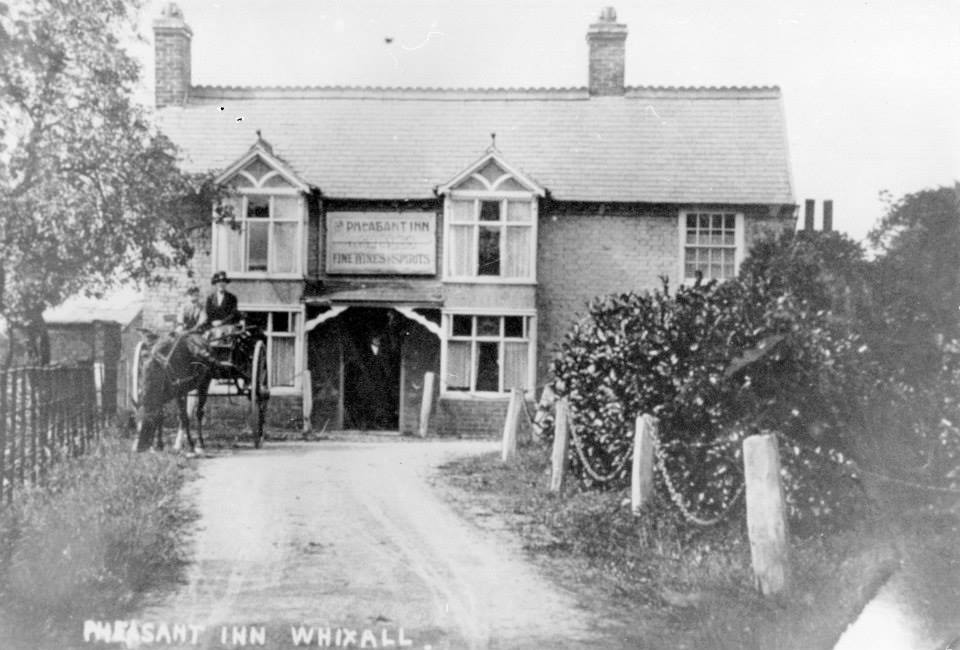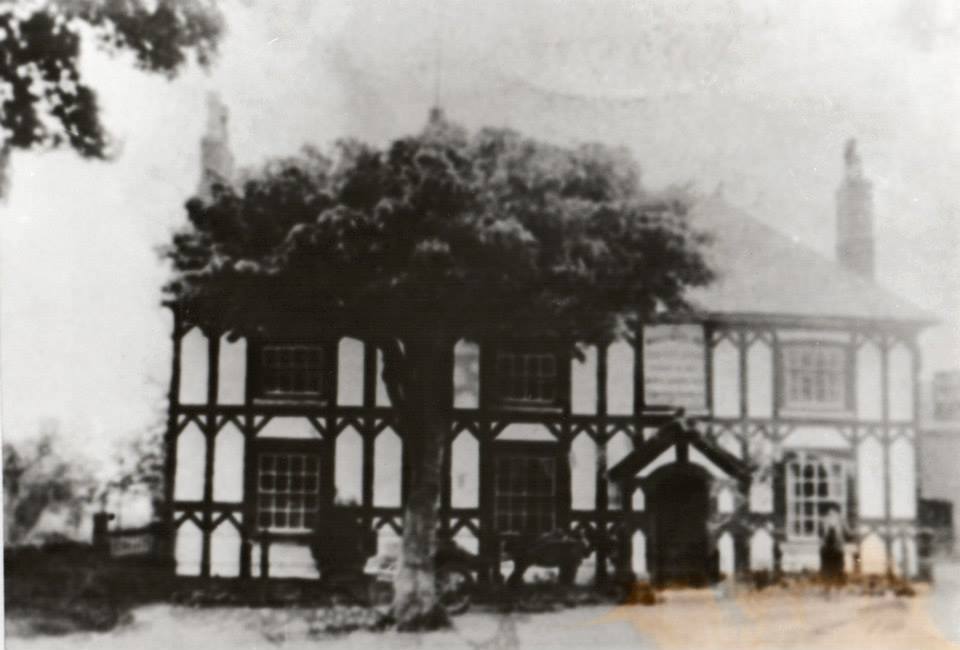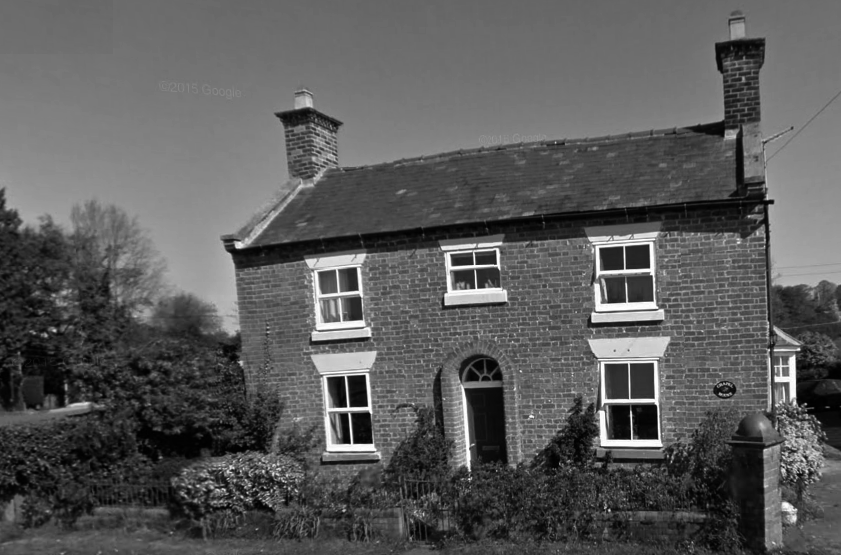Whixall’s Alehouses – c1830-1914
The following account, researched and authored by Bill Cliftlands, appeared in two parts within the ‘Community News’. The first part in Dec 2019 the second in 2020.
Whixall, after the fiery end of the Waggoners’ Inn, had no local alehouse to serve thirsty Whixallites. Yet in the 1950s it had as many as six. The Pheasant and the Waggoners sat either side of Platt Lane while the Lord Hill opened its doors for those living towards Far End; Chapel House Inn was indeed the present Chapel House awaiting those with a thirst after a service at St. Mary’s. The sites of the fifth and sixth pubs – the Plough and the Huntsman’s Arms are unknown; though The Plough was said to be close to the canal at Edstatston and was said to be ‘at Whixall Moss’. It is difficult to date the opening of these public houses. However, the Plough was certainly in existence by 1831, and the Pheasant and the Waggoners by the mid-1820s. Some evidence suggests that the Lord Hill was licensed around 1822, although this is inconclusive. There was at least one public house in Whixall in the 18th century but it was unnamed.

The Pheasant Public House, date unknown.
Inside pubs
Available records have few details of Whixall’s public houses. The Waggoners saw some expansion between 1891 and 1896. While the accommodation in 1896 was said to have ‘a bar and four rooms down [at ground level] and five rooms up‘, and was able to accommodate five lodgers, in 1891 it had just three rooms on the ground floor and room for just four lodgers. While in 1891 it had room for stabling four horses at night and six horses during the day, in 1896, it had room for stabling six horses by night and twelve by day (this did fall by 1901). We know that in 1868 it had a ‘large club-room’; the Pheasant was recorded to have such a room in 1891. The Waggoners was in ‘Good repair and clean’. The Pheasant had less accommodation than the Waggoners. In 1891 the Pheasant had a bar and three rooms at ground level and three rooms and a clubhouse upstairs. There was no room for lodgers. Three horses could be kept at night, six during the day. The house and buildings were ‘in a bad state of repair’ and in 1896 the pub was said to be ‘undergoing repairs’. By 1901, however, it was said to be in ‘good repair and clean’.
For inside the bar area there are only snatches of evidence. We know that in the late 1850s, the Plough had glasses and porter cups and, in the 1860s, that a fiddler played. The Pheasant used Richard Baxter of Whitchurch to purchase its ‘aerated waters’ around 1881. He bought ginger beer. Three-quarts of beer was described as a ‘sixpenny’. The landlord of the Huntsman’s Arms, Richard ‘Dickie’ Allman, would keep a ‘slate’ for a customer or, if necessary, write the debt on a cupboard door, with the debt transferred to a book after a couple of weeks.
Social Activities
The public houses were community hubs and hosted a range of social activities. In 1882, the Lord Hill Inn was described as ‘necessity for the wants of the neighbourhood‘ since the inn was used for election purposes, for town meetings and ‘for refreshments’ by men who worked on the Moss. The Waggoners was used by men from the canal and turf-cutters from the Moss. The pubs were convenient stopping places for travellers or visitors to the parish. In 1868 the Waggoners hosted a pigeon shooting match. In 1898 a fiddler was entertaining the drinkers at the Plough. In 1870 Chance Brothers and Co., (glass manufacturers) celebrated their company pay day in the Waggoners. The Waggoners and the Pheasant were at the heart of a major parish entertainment, the September ‘Whixall Wakes’. It involved ‘visiting and entertaining each other bountifully according to custom’. The fun in 1867 included ‘bag-racing’ (i.e. sack-racing) and ‘foot racing’ as well as ‘a lot of impromptu affairs’. According to the Wellington Journal, the games were engaged in ‘with zest peculiar to Whixall people alone’. It was said that the Whixallites ‘took their beer quietly’, returning to their homes ‘like decent people’ fairly early in the evening. In 1870, the Monday of Wakes saw sports held at the two inns.
Local friendly societies used the public houses in order to celebrate their success. In 1868 the Plough hosted the ‘Ancient Order of Foresters’ Friendly Society’ whose ‘court’, ‘Pride of the Moss’ in the Shrewsbury District, was to hold its ‘First Anniversary’ there. The public house put on a dinner and a dance on the green. The tickets, which included ale, cost 2s 6d each. The day began at 11 o’clock with the members gathering together with banners and headed by the Wem Rifle Band. They paraded around the village and then processed to St Mary’s Church. The Plough’s host and hostess provided an ‘excellent dinner’. The Oddfellows Friendly Society, by meeting at both the Pheasant and the Waggoners, confirmed their particularly popularity in the parish in late Victorian times.
Inquest and Auctions
As centres of the community, the public houses were often used for quarter sessions’ inquisitions into suspicious deaths. These had to be held within 48 hours of the death. The use of the public houses allowed the inquisitions to be held in the locality so facilitating the swearing of juries from the locality. The warrant to impanel a jury would be carried out by a police constable. The jurors tended to be substantial householders who were to view the body and hear witnesses.Families were also able to attend with the minimum of fuss. More prosaically, a key reason for holding an inquest in the public house was that it has a table big enough upon which to bear the body and had sufficient space for the jury of twelve, the witnesses and the coroner.

The Waggoners Public House, date unknown.
The inquests were obviously emotional affairs. That held in the Waggoners in 1864 was over the death of someone ‘found drowned in a…canal’. An inquest jury at the Lord Hill Inn in 1875 found the death of a turfman’s son was due to ‘accidentally drown(ing) while sliding in the ice’ at Alexandria’s Arm. It was noted to be a particularly ‘pitiable case’. In 1887, the coroner called upon the local jury to determine whether the death of a Whixall man was the result of murder, manslaughter or accident. The jury verdict was manslaughter, a verdict which was said to have ‘occasioned much surprise’. The Pheasant also held inquests. The District Coroner held an inquiry there in October 1881 investigating a sudden death. Jurors from the locality were named, such as Henry Williams (foreman), William Sutton, L.Preston and Levi Green. The verdict was death through natural causes.
Public houses were also perfect places to hold a public auction. For those coming from afar, a public house would be easier to find – particularly useful in Whixall. An auction was held at the Waggoners as early as April 1884, when Messrs Lakin was to sell off a freehold house and blacksmith’s shop. Many auction houses used the Waggoners in the 19th century – T.B New., W.R.D Green., Cooper & Son and Parry and Batho to name but a few. October 1897 saw the Waggoners used at least three times by Cooper and Son, property mainly in Rack Lane (poultry), Green Lane (farm stock) and a dwelling house situated in Sandy bank. 1855 appeared to be a difficult year for the Chapel House Inn since the landlady, Mrs Keay, sold at the Inn various livestock, carts and agricultural implements. Interestingly she also sold ‘brewing vessels and ale casks’. In 1897, the Pheasant was used by F.G Richards to sell the dwelling-house and outbuildings and four acres at Chatty Bottoms.
Disorder
Certainly, in 1891, both the Pheasant and the Waggoners were under the watchful eye of the local constables given that both pubs, two hundred yards apart, were only one hundred yards from the ‘Constables’ station’ (!) Earlier, in February 1868, three Whixallites were charged with ‘firing off guns and disturbing the peace’ after emerging from the Waggoners Inn. Police constable Lawley warned them not to fire again, but all three fired repeatedly for half an hour. All were bound over to keep the peace and each were to pay 10s 6d costs. The Chester Chronicle reported PC Lawley as saying that the men had ‘wilfully and maliciously harmed the neighbourhood’. The chairman of Whitchurch Petty Sessions, T.H. Sandford, declared that landlords keeping pubs open after 11pm would be accused of ‘keeping disorderly houses’. Mr Edwards, of the Waggoners was reprimanded by the Chairman, ‘who told him he must be very careful how he conducted his house in the future.’

Chapel House Public House. Now a private residence.
Drunkenness and Lax Licensees
Of course the key cause of a keeping a disorderly house was drunkenness. Only occasionally would drinking have led to drunkenness but since most of the information is from legal records (particularly the petty sessions at Whitchurch) it seems as though all the public houses in Whixall were disorderly a lot of the time! The authorities believed that society itself was at risk, thus the Rev Sir William Honeyman on the Wem Bench said in the summer of 1878, ‘drunkenness was the crying sin of this country and required stringent means to check it.‘
However, it is the Whitchurch Bench that had to deal with the less salubrious side of the Whixall Wakes in October 1868, in the shape of a boatman, John Keay. He was accused of being drunk by the police and ‘using epithets to them’. He admitted being drunk but could not recollect the ‘riotous’ behaviour. He was ordered to pay only 8s expenses. John Edwards was found drunk on the premises of his brother, Moses Edwards, the landlord of the Waggoners. John admitted that he had had ‘a few glasses’ and that the ale had ‘got over him’ and that he ‘was sorry for it’.
Drunkenness was not only blamed on those worse the wear for drink, but those who had allowed them to get into that state, profit preferred to moral probity. John Minshall, landlord of the Plough with a licence to sell ‘Beer and cider by retail’, got into trouble by selling ale after ten o’clock – thereby breaking his licence. Later, Richard Allman, also landlord of the Plough, asked for a spirit licence in 1866, but because he had received two convictions against him in the past twelve months, his request was refused. In May 1892, the landlord of the Waggoners was accused of ‘supplying beer to a drunken person’ winning for himself a fine of 11s 10d as well as £1 8s 2d costs. Given the danger of prosecution, publicans had to take action against the disorderly when necessary; thus George Powell charged George Harding, a labourer, for ‘being disorderly and refusing to quit the Inn [the Waggoners] on December 20th’ 1913. George Powell charged another Whixall labourer, for ‘being disorderly and refusing to quit the Inn’ in February 1914.
The authorities sought to avoid drunkenness by the proper regulation of the public houses in order to protect the local community. Again, this could be tough on the licensees. Mary Rogers was accused of selling drinks in a tent outside the inn. Previously permissible, it was no longer permitted after the passing of the 1872 Licensing Act. The case was dismissed due to the misunderstanding, but Rogers was still ordered to pay costs. But some licensees were clearly guilty. Josiah Jarvis, landlord of the Lord Hill, was fined in 1882 for allowing drunkenness in his house. The Chairman noted that he ‘understood the house to be very badly conducted and a nuisance to the neighbourhood’. Later in the year, Superintendent Howells objected to the renewal of his licence since Jarvis had been charged with ‘permitting drunkenness’ and because he had ‘not conducted his business in accordance with the statutes…There had been frequent complaints to the Magistrates and police, and it had caused the police great trouble’. In fact, Whixall was divided over whether the Lord Hill should be licenced. A leading Anglican, John Dawson, supported the licensing of the inn, while nonconformists such as Richard and Elijah Butler opposed the licensing. Again, publicans could avoid the force of the law by obeying it, for example, by applying for necessary licences. Mrs Edwards of The Waggoners applied for an occasional licence for the Oddfellows Club Anniversary in 1890.] In June 1903, Susan Rogers, landlady of the Pheasant, was careful to apply for an ‘occasional licence’ for the Oddfellows Anniversary.
Temperance
Alcoholic drink was not the issue for the authorities, but drunkenness was. Yet social reformers and many nonconformists did go further and came to oppose all alcoholic drinks in the nineteenth century. Temperance societies were set up all over England, and Shropshire was no different. The Whitchurch Temperance Society, meeting in 1866, expected as many as 200 to attend. The Wellington Journal had strong views on the licensing of beerhouses in September 1869. 1869 was the first year in which the granting of licenses was put in the hands of the magistrates. The Journal suggested that the readers would know that ‘from one year’s end to another there is generally a pretty long catalogue of drunken cases tried before the Bench of magistrates at Whitchurch’ and insisted that all ‘order-loving people’ would support such controls given that beerhouses caused ‘general evil to society’. However, the paper rejected the temperance cause; to close all beerhouses would be unfair for those innkeepers who kept orderly houses; besides it would interfere ‘with the liberty of those who choose to make use of the houses’. However, the Wellington Journal asserted that the magistrates should take away the licences of the unruly innkeepers. The Chairman of the 1869 Petty Sessions read the 19th clause of the New Beerhouse Act whereby any licensed house open beyond licensing hours would be subject to a fine of 40s. Cautions were issued against those houses against which complaints had been made. In 1892, the licensing sessions noted that there was one public house for 245 people in the Whitchurch district and that year saw a sudden increase in offences of drunkenness and like offences, 92 to 53 the previous year. This simply reinforced the need to license effectively and to withdraw licenses where appropriate. An attempt to prevent a licence being granted to Douglas McLaren was partly based on the fact that the Waggoners’ public house was ‘about 200 yards from another full-licensed house’- in other words, the Pheasant.
Nonconformists campaigned for closing on a Sunday and Shropshire did see some response, indeed, within Whixall itself. Drunken behaviour close to the Waggoners Inn in 1873 was noted with some sadness in 1873. A group of friends had drunk whisky so excessively ‘that all of them became dead drunk’. One fell from his chair onto his head. The coroner concluded that his death was from ‘natural causes’. The abovementioned warning to Edwards of the Waggoners about the conduct of his house, arguably caused Edwards to see the light, and a notice in the Herald in January 1871, advertised the fact that Edwards intended to close the Waggoners’ on Sundays ‘for the Sale of Ales and Liquors’. Part of the temperance message was, perhaps, getting through.